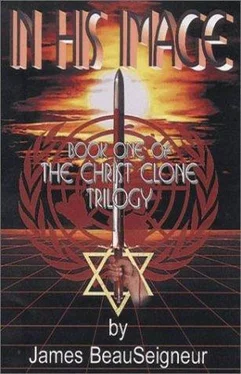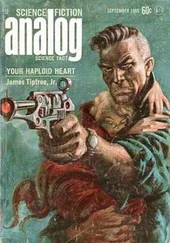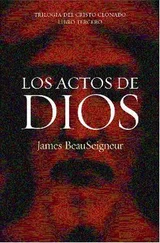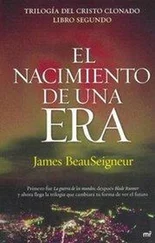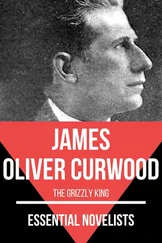Still, some had it much worse. The dead who had no one to bury them had been laid by the thousands in mass graves, some with no markers at all. In the city of Washington the poor had tried to bury their dead on the Mall (the strip of park that runs from the Capital to the Lincoln Memorial), but were turned away by Park Police and National Guard. At length, some expressed their frustration and protest by leaving the dead on curbs with the garbage.
Among those who died were many celebrities of one sort or another: politicians, religious leaders, heads of state, a few actors and actresses. The U.S. lost twelve Senators, sixty-odd Congressmen, three Cabinet members, and the Vice President. It seemed that everyone had lost someone: wives, husbands, children, parents.
As the sun rose above the fence slats on Decker's right, the individual blades of grass released almost audible whispers as their moist coats of dew began to slowly evaporate into the morning air. Decker heard the sliding glass door open but did not raise his eyes from the ground to look.
Christopher Goodman approached Decker, stopping a few feet short. After a moment he realized that he would have to speak first. "Breakfast is ready," he said softly but brightly, adding that he had fixed Decker's favorite, waffles with plenty of bacon on the side.
Decker looked up after a second, smiled appreciatively, and extended his hand toward Christopher. "Give me a hand up," he said. Christopher never asked Decker about the hours he spent sitting by the grave in the backyard. He just seemed to understand and allowed Decker the privacy of his thoughts.
"What about your family?" Decker asked, opening the subject as if in mid-conversation.
Christopher didn't miss a beat but answered as though he knew and understood exactly what Decker had been thinking. "When they didn't come home and they didn't call, I decided to call the airline. They told me that Uncle Harry and Aunt Martha were listed on one of the planes that crashed when the Disaster struck. They said that they didn't have enough people to handle all of the calls, much less to clean up all of the crash sites and evacuate all the bodies and notify their next of kin." Christopher paused. "They did tell me where the plane went down," Christopher said, pausing again. "I tried to find it on my way here but it was a long way from any roads." Christopher seemed distraught by the memory of the agonizing decision he had made to leave his aunt's and uncle's bodies in the wilderness where their plane crashed.
Decker was touched by Christopher's obvious pain. For three weeks now Christopher had provided Decker with cheerful companionship, never once saying a word about his own loss.
Perhaps, Decker thought, it was time to start thinking of someone besides himself. Without thinking it through, Decker asked, "Would you like for me to go with you to find them? We could take them home to Los Angeles and bury them there, or we could bring them here and bury them in the backyard near Elizabeth, Hope and Louisa."
Christopher seemed to appreciate the offer but responded that he didn't think it was a good idea. "No, it's, uh… too far," he answered.
"That's all right. I can help you drive," Decker told the precocious fourteen-year-old, trying to make a joke and not catching the hint in Christopher's voice that he preferred not to talk about it.
"Mr. Hawthorne," Christopher said directly, "their bodies have been up on that mountain, exposed to the elements and animals for nearly a month. I don't think… "
Decker was shocked at his own stupidity. How could he have missed that? "I'm sorry, Christopher. I didn't think."
"It's okay, Mr Hawthorne," Christopher said, and from the understanding look on his face, Decker could tell that it really was. Christopher had apparently accepted the harsh truth with determined resolve to go on. "Come on," he said. "The waffles are getting cold."
Decker was beginning to understand Harry Goodman's fear of disclosing Christopher's origin. Over the past few weeks, almost without knowing it, Decker had come to think of Christopher almost as his own son. Perhaps it was because of the loss of Elizabeth, Hope and Louisa. Much of the feeling, though, was due to Christopher's totally unselfish attitude: always giving of himself and never asking for anything more in return than room and board. Decker finally and firmly resolved that the story of Christopher's origin was one the world could do without.
Three days later Decker was spending the afternoon reading through recent copies of NewsWorld that Hank Asher had brought over to help bring him up to date on the world, restore his interest in life, and assist in his recovery. He was reading the special issue on the effects of the Disaster and how people were handling their pain and loss, when the phone rang.
"Mr. Hawthorne's residence," Christopher answered, sounding more like a domestic servant than a fourteen-year-old boy. "Yes, just a moment, I'll get him for you." Decker got up and headed for the phone as Christopher reported that it was Mr. Asher calling from NewsWorld.
"Hank, how are you?" Decker asked warmly.
"I'm fine. How are you?" Asher's voice made it clear he was willing to listen to a detailed response.
"Much better, actually. Really, I'm doing all right," Decker said resolutely.
Hank Asher understood the determination in Decker's voice. He was probably a long way from being 'all right' but he was determined to be all right and that, in itself, was a major step in the right direction. "Good," Asher said. "So when are you going to get back to work and start earning your keep, you bum?"
Decker knew that Asher was joking, but he sensed that there was a somewhat serious nature to the question. It was clear enough that Asher's real concern was getting Decker back into life; back into the work that was his life. Decker appreciated Hank's concern but was in no hurry to face the world just yet. "I don't know," he answered, "maybe after the first of the year."
Asher didn't respond.
Decker waited and then, feeling a little guilty about receiving a salary without doing anything to earn it, he moderated his answer. "Well, maybe in a few more weeks."
Asher still didn't answer.
Decker had compromised all that he cared to, so for a long moment there was total silence. Finally, Asher spoke. "I need you in New York on Monday."
"Monday!" Decker blurted. "If you've got a story in New York why not just have someone from the New York office cover it?"
"The New York office is understaffed since the Disaster, and really, it's just a small assignment. It'll be good for you. You'll be in and out in one day. I'd send someone else, but he's your friend. You could do the whole interview and still have plenty of time to see a show. You know what they say, Disaster or no, 'the show must go on.'"
Decker ignored Asher's darkhumor. "What do you mean, he's my friend? Who are you talking about?"
Hank Asher knew exactly how to get to Decker Hawthorne: just appeal to his curiosity. He had taken the bait; now to reel him in.
"Jon Hansen," Asher answered.
"The British Ambassador to the U.N.?" Decker asked, more out of surprise than for confirmation.
Asher didn't answer the obvious. "I've already set up the interview for Monday afternoon and bought your plane ticket."
"I don't know, Hank," Decker said reluctantly, but yielding a little ground. "What's this all about? What's the story?"
"It's about Hansen's report on the situation in the Middle East. The U.N. lost nearly 2000 men assigned to that area in the Disaster. They've tried to replace them with reinforcements but many of the countries that provide the U.N. with soldiers were hit just as badly. The U.S., Britain, Germany, Switzerland, all have major losses, as high as twenty percent. With the threat of war in the Middle East because of the Jews building a temple on the site of the Dome of the Rock, there's serious doubts that the U.N. forces can maintain the peace.
Читать дальше
